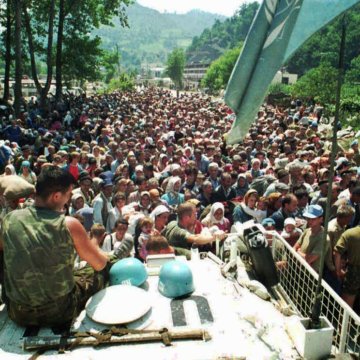- About
- Topics
- Picks
- Audio
- Story
- In-Depth
- Opinion
- News
- Donate
-
Signup for our newsletterOur Editors' Best Picks.Send
Read, Debate: Engage.
| located: | Bosnia and Herzegovina, Netherlands |
|---|---|
| editor: | Shira Jeczmien |
In case you’re in need of catching up with why the Netherlands have been found “partially liable for 300 Srebrenica deaths” as The Guardian headline reads, I’ll jump back a couple dozen years to reignite the memory (or give a brief telling, as UK schools in particular are culpable of neglecting to teach this crucial history).
It was 1995 and edging towards the end of the brutal three year Bosnian War which promptly followed after the 1992 Bosnian referendum vote for independence from the Socialist Federal Republic of Yugoslavia; succeeding in the footsteps of Slovenia and Croatia who opted out a year prior. In need of buffering peace, Dutch United Nations peacekeepers were based in the Bosnian area of Srebrenica, yet as the Bosnian Serb troops, led by military leader Ratko Mladić, had invaded the UN safe zone demanding the 300 Bosniak (Bosnian Muslims) under refuge, the under-armed and ill equipped peacemakers were reluctant to do anything else. The genocide following this event, known as the Srebrenica Massacre saw more than 8,000 killed.
Twenty years later the Dutch UN peacekeepers who endured the horror, as well as hundreds of families of the murdered Bosniak men are finally witnessing the Netherlands taking responsibility for the negligence that took place during that week in July. The ruling by the District Court in The Hague is without question a gesture of progressive accountability on behalf of the entire nation – which is notably rare. Families of the 300 men who were handed over will see compensation, but let’s not forget that this figure is a fraction of the total lives lost, and therefore should be considered progress, but not yet celebrated as triumph.
What is particularly salient is that this ruling not only admits the responsibility the Dutch troops had in this event, instead it exposes a systemic acquittal pattern of other nations amidst war in international UN peacemaking. While this is perhaps a minor progression for the thousands of people who lost their lives in Srebrenica, the Netherlands are carving the way forward for accountability in the dark and murky water when international UN troops are involved, in one way or another, in human rights violation. Only time will tell if this trembling has spurred a wave.
